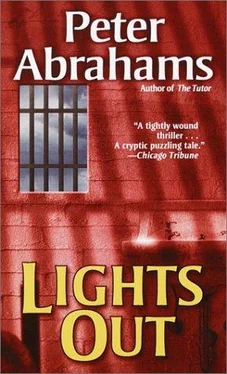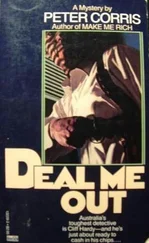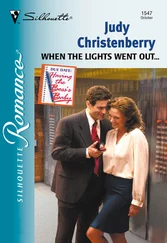Peter Abrahams - Lights Out
Здесь есть возможность читать онлайн «Peter Abrahams - Lights Out» весь текст электронной книги совершенно бесплатно (целиком полную версию без сокращений). В некоторых случаях можно слушать аудио, скачать через торрент в формате fb2 и присутствует краткое содержание. Год выпуска: 2002, ISBN: 2002, Издательство: Fawcett Books, Жанр: Триллер, на английском языке. Описание произведения, (предисловие) а так же отзывы посетителей доступны на портале библиотеки ЛибКат.
- Название:Lights Out
- Автор:
- Издательство:Fawcett Books
- Жанр:
- Год:2002
- ISBN:978-0345445780
- Рейтинг книги:4 / 5. Голосов: 1
-
Избранное:Добавить в избранное
- Отзывы:
-
Ваша оценка:
- 80
- 1
- 2
- 3
- 4
- 5
Lights Out: краткое содержание, описание и аннотация
Предлагаем к чтению аннотацию, описание, краткое содержание или предисловие (зависит от того, что написал сам автор книги «Lights Out»). Если вы не нашли необходимую информацию о книге — напишите в комментариях, мы постараемся отыскать её.
Lights Out — читать онлайн бесплатно полную книгу (весь текст) целиком
Ниже представлен текст книги, разбитый по страницам. Система сохранения места последней прочитанной страницы, позволяет с удобством читать онлайн бесплатно книгу «Lights Out», без необходимости каждый раз заново искать на чём Вы остановились. Поставьте закладку, и сможете в любой момент перейти на страницу, на которой закончили чтение.
Интервал:
Закладка:
She found herself standing next to the woman with the sign. The woman had a milk-white face, bony arms, hair as black as her dress.
“They don’t interview me anymore,” she said.
“Did they use to?”
“Every time. Now they say they want a fresh point of view. Just when it’s most vital that I bear witness.”
“Aren’t you bearing witness anyway?”
“It’s hardly the same if the camera’s not running.” The woman, who had been gazing at the prison, glanced at Karen. “Everyone knows that.”
“What’s special about this time?”
“Willie Boggs.”
“I don’t know much about him.”
“Willie Boggs is a great man,” the woman said. “I’ve written him hundreds of letters. I mean that literally. Hundreds. He’s a wonderful human being, and now they’re going to murder him, when they should be setting him free at last. He could do so much good, out here in the world.”
“Did he ever write back?” Karen asked.
The woman closed her eyes. “Once,” she said. “He wrote me a beautiful letter.” Her eyes opened. “He writes like an angel, you know. If he’d written a book, it would have been published. I guarantee.”
“What did he say?”
“Say?”
“In his letter.”
The woman reached into the pocket of her dress, pulled out an envelope. “I’ll let you read it, if you want.”
“Not enough light,” said Karen.
The woman had a pencil flash. She stood close to Karen, aiming its beam. Karen could smell her breath. She read:
Dear Luanne:
Thanks for your letters. It is good to get letters in here as you can imagine-or maybe you can not. Of course it is not always easy to anser every one. My time for such activities is limited and most of it I spend on my case, as I am sure you understand.
Sincerely,
W. Boggs
“Very sensible,” Karen said, handing back the letter.
Luanne shone the pencil flash in her eyes. “But doesn’t he write beautifully?” she said.
Karen shielded her eyes. “He writes well,” she said, “based on this sample.” But she’d noticed the single spelling mistake in the letter, like the flaw that had made him kill the liquor-store clerk, or be present at the killing, or drive the getaway car for the killer.
Luanne snapped off the light, said, “He’s a great man,” and moved away, holding up her sign.
Three or four more people appeared; but not Eddie. The vendor returned, sold another beer to the man in cutoffs, a hot dog to the nun, coffee to the TV crew, another diet soda to Karen. The air was dusty and her throat dry.
The reporter approached her.
“Are you going to be here till the end?”
“When’s that?”
“Midnight,” the reporter said. “They always do it at midnight, for some reason.”
“Like Cinderella.”
“That’s good,” said the reporter. “You’re articulate. We need someone for a short interview after it’s over.”
“Try Luanne,” Karen said.
As midnight approached, the priest led most of the vigilants in prayer, while the Buddhist monk and a few others went off by themselves to chant. Karen participated in neither ceremony.
The distance to the prison, so brightly lit in the night, seemed to have shrunk, and it kept shrinking all the way to midnight, the prison seeming to come closer and closer. “Give us a miracle,” said a man, raising his arms to the sky like Moses in a painting.
After that there was silence. Plenty of lumiere , Karen thought, but no son .
Midnight brought son . “No, no,” someone screamed at the prison walls. The baby in the stroller awoke and started to wail. The man in cutoffs hurled a beer can in the direction of the stone walls and yelled, “You fucking no-good faggot butchers.”
“I beg of you,” the priest said to him.
The reporter said, “Remember to edit that out.”
The woman in business dress began to cry.
Someone turned up a portable radio. At twelve-fifteen it passed on the official pronunciation of death. Then there was more crying, more praying, more chanting.
Ten minutes later, the TV truck was gone. The Buddhist monk soon followed, and after him the priest, the nun, the others. The vendor sold one more beer to the leathery man in cutoffs, then locked up his cart and pushed it away. The leathery man wandered into the night.
That left Karen and Luanne. “He’s a martyr now,” Luanne said, still holding up her sign.
“To what cause?”
“You’re pretty cynical, you know that? Why did you even bother coming if you don’t care?”
Karen looked around, saw that the only car still there was hers. “Can I drop you somewhere?” she said.
Luanne shook her head. “I’m not going anywhere till he comes out. I always stay till I see them free.”
“What do you mean?”
“They’ll be taking him to the county after the show’s all over. You’ll see if you stick around.”
Karen stuck around. The night was pleasant, the moon was up, the prison glowed like an anti-Xanadu. Karen found herself thinking about Coleridge, “The Rime of the Ancient Mariner,” Eddie Nye. Jack had got his hands on a bundle; it would probably take her months to discover how. Then he and Eddie had taken off; she might never find out where. Coming here had been a long shot. What next? She had no idea. She searched her mind for one; Luanne stood beside her, silent, holding up her sign.
An idea did come to Karen, but it was fuzzy. Something to do with bananas. Before she could bring it into focus, headlights appeared, and Luanne said, “Here he comes.” She hurried to the side of the road. Karen followed.
The headlights came closer. An ambulance. It wasn’t sounding the siren or flashing the light display. It wasn’t even going fast. There were two men in the front; Karen thought she recognized the one in the passenger seat. As the ambulance went by, Luanne stepped onto the road and cried, “Willie Boggs. Willie Boggs.” It almost hit her.
The ambulance drove on, rounded a bend, disappeared. Luanne dropped her sign where she stood, turned to Karen. “That’s it,” she said. “There’s nothing more I can do.”
They got into Karen’s rental car and drove off. They passed signs in the night: Motel 6, Mufflers 4U, Lanny’s Used Tires, Bud Lite, Pink Lady Lounge, All the Shrimp You Cn Eat $6.95, XXX Video, Happy Hour.
“Where can I drop you?” Karen said.
“There’s a Dunkin’ Donuts up ahead.”
Taillights shone in the distance, shrank quickly and vanished; someone going very fast. Then Karen noticed a second set of taillights that seemed not to be moving at all. They grew bigger, sharper. Karen sped up a little. She saw a car parked on the shoulder of the road at a funny angle. Not on the shoulder, actually, but in the adjacent field; and not a car but an ambulance.
Karen pulled off the road, got out of the car, walked toward the ambulance. Lights on, engine off, no sign of an accident. She looked in the front. The driver was alone, slumped forward on the wheel, as though he’d grown too tired to go on. Karen opened the door. The interior light went on, illuminating the bullet hole in the left side of his head.
Karen walked around to the back, tried the handle on the big door. It turned. The door swung open. No interior light went on; she saw shadowy forms.
“Luanne,” she called.
But Luanne was right beside her. “I’m here. What’s happened?”
“Give me your flash.”
Launne handed her the flash. Karen switched it on, shone it into the back of the ambulance. There was a man-sized bag on the floor, of the type the bodies came home in from Vietnam. A man slouched against the wall beside it, a piney-smelling man who was staring at nothing.
Читать дальшеИнтервал:
Закладка:
Похожие книги на «Lights Out»
Представляем Вашему вниманию похожие книги на «Lights Out» списком для выбора. Мы отобрали схожую по названию и смыслу литературу в надежде предоставить читателям больше вариантов отыскать новые, интересные, ещё непрочитанные произведения.
Обсуждение, отзывы о книге «Lights Out» и просто собственные мнения читателей. Оставьте ваши комментарии, напишите, что Вы думаете о произведении, его смысле или главных героях. Укажите что конкретно понравилось, а что нет, и почему Вы так считаете.












